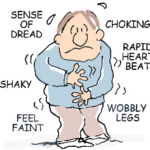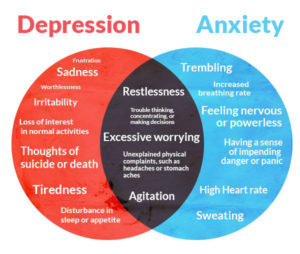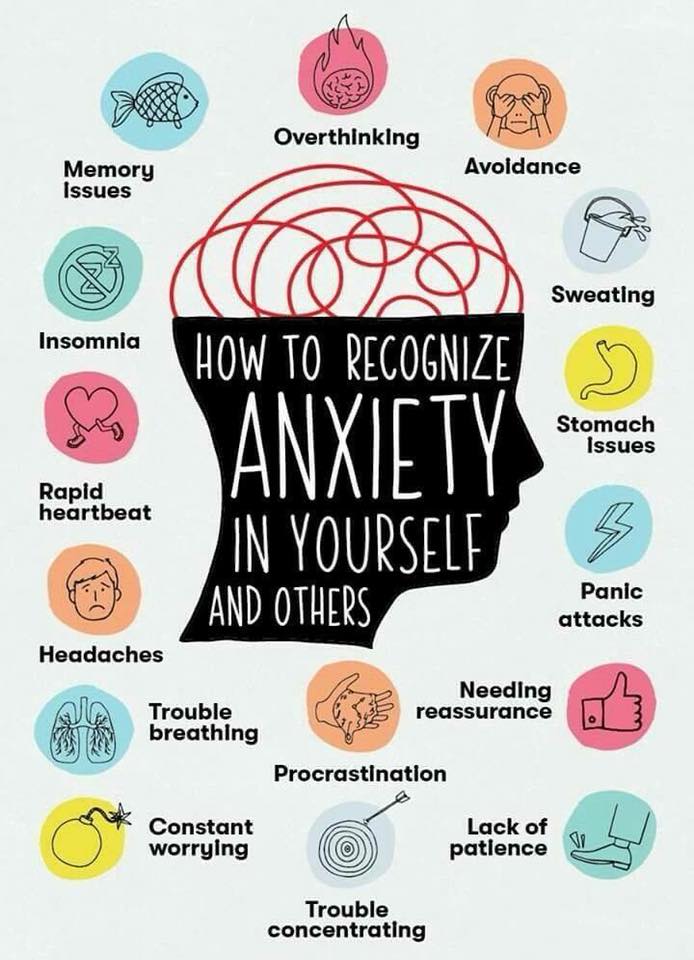What is Anxiety?
What is anxiety and what are the causes and what is the best anxiety treatment? There are many types of anxiety disorders that include panic disorder, obsessive compulsive disorder, post traumatic stress disorder, social anxiety disorder, specific phobias, and generalized anxiety disorder. Anxiety is a normal human emotion that everyone experiences at times. Many people feel anxious or nervous, when faced with a problem at work, before taking a test, or making an important decision. Anxiety disorders are  different from the normal stress of life and can cause such distress that it interferes with a person’s ability to lead a normal life. An anxiety disorder is a serious mental illness. For people with anxiety disorders, worry and fear are constant and overwhelming, and can be crippling. Patients have reported that the physical pain and mental anguish far surpasses that of many other physical illnesses. Anxiety disorders are usually genetically grounded in the physiology of the brain’s inability to regulate the neurotransmitters. Some studies have demonstrated that the stress of life on a fetus can program the genes and thus create a predisposition to anxiety. If you think you might have anxiety, send me a note here.
different from the normal stress of life and can cause such distress that it interferes with a person’s ability to lead a normal life. An anxiety disorder is a serious mental illness. For people with anxiety disorders, worry and fear are constant and overwhelming, and can be crippling. Patients have reported that the physical pain and mental anguish far surpasses that of many other physical illnesses. Anxiety disorders are usually genetically grounded in the physiology of the brain’s inability to regulate the neurotransmitters. Some studies have demonstrated that the stress of life on a fetus can program the genes and thus create a predisposition to anxiety. If you think you might have anxiety, send me a note here.
Types of Anxiety Disorders
There are several types of anxiety disorders, including:
Panic disorder: People with this condition have feelings of terror that strike suddenly and repeatedly with no warning. Other symptoms of a panic attack include sweating, chest pain, heart palpitations, and a feeling of choking, which may make the person feel like he or she is having a heart attack or “going crazy.”
Obsessive-compulsive disorder (OCD): People with OCD are plagued by constant thoughts or fears that cause them to perform certain rituals or routines. The disturbing thoughts are called obsessions, and the rituals are called compulsions. An example is a person with an unreasonable fear of germs who constantly washes his or her hands.
Post-traumatic stress disorder (PTSD): PTSD is a condition that can develop following a traumatic and or terrifying event such as a sexual or physical assault, the unexpected death of a loved one, or a natural disaster. People with PTSD often have lasting and  frightening thoughts and memories of the event, and tend to be emotionally numb.
frightening thoughts and memories of the event, and tend to be emotionally numb.
Social anxiety disorder: Also called social phobia involves overwhelming worry and self-consciousness about everyday social situations. The worry often centers on a fear of being judged by others, or behaving in a way that might cause embarrassment or lead to ridicule.
Specific phobias: A specific phobia is an intense fear of a specific object or situation such as snakes, heights, or flying. The level of fear usually is inappropriate to the situation and may cause the person to avoid common everyday situations.
Generalized anxiety disorder: This disorder involves excessive, unrealistic worry and tension, even if there is little or nothing to provoke the anxiety and manifests itself in psychological and physical symptoms.
Possible Symptoms of an Anxiety Disorder
Symptoms vary depending on the type of anxiety disorder, but general symptoms include:
- Feelings of panic, fear, and uneasiness
- Uncontrollable, obsessive thoughts
- Repeated thoughts or flashbacks of traumatic experiences
- Nightmares
- Obsessive behaviors, such as repeated hand washing
- Problems sleeping
- Cold or sweaty hands or feet
- Shortness of breath
- Palpitations
- An inability to be still and calm
- Dry mouth
- Numbness or tingling in the hands or feet
- Nausea
- Muscle tension
- Dizziness
Possible Causes Anxiety
There is much anxiety disorder research being done to try to find the causes of anxiety, but one thing that is settled is that anxiety disorders are ultimately physiological disorders that can be caused by the environment, DNA or both; just like other forms of mental illness. As scientists continue their research on mental illness, it is becoming clear that many of these disorders are caused by a combination of factors including changes in the brain and environmental stress. Read more about the relationship of the environmental stress and genetics: is anxiety genetic. This is new data that claims that prenatal stressors can actually change the genes of the fetus and therefore provide the genetic basis for many mental illnesses. Another study shows a connection with lingering anxiety and PTSD with the naturally occurring opioid peptide dynorphin. This may show the physiological grounding of anxiety. Other environmental factors that play a role in a developing fetus would be a pregnant mother deficient in the B vitamins which would increase fetal stress; or that her body could not produce sufficient GABA…The good news is that other studies have shown that genetic engineering is making strides in identifying and manipulating these genes, thus giving us hope for a cure someday. These studies are in the very early stages and show some hope in the future for more effective anxiety treatment or even cures. Knowing these risk factors, we can also avoid these stressful situations.
Like many other illnesses, such as diabetes, anxiety disorders may be caused by chemical imbalances in the body. Studies have shown that severe or long-lasting stress can change the balance of chemicals in the brain that control mood. Other studies have shown that people with anxiety disorders have changes in certain brain structures that control memory or mood. In addition, studies have shown that anxiety disorders run in families which means that they can be inherited from one or both parents, like hair or eye color. Some statistics claim that 60% of children with anxious parents will have some form of anxiety. 80% of parents whose parents were anxious, will have children with anxiety disorders as well. Anxiety disorders affect about 19 million adult Americans. Most anxiety disorders begin in childhood, adolescence, and early adulthood. They occur slightly more often in women than in men.
Diagnosing Anxiety Disorders
If symptoms of an anxiety disorder are present, the doctor will begin an evaluation by asking you questions about your medical history and performing a physical exam. Although there are no laboratory tests to specifically diagnose anxiety disorders, the doctor may use various tests to look for physical illness as the cause of the symptoms. If no physical illness is found, you may be referred to a psychiatrist or psychologist, mental health professionals who are specially trained to diagnose and treat mental illnesses. Psychiatrists and psychologists use specially designed interview and assessment tools to evaluate patients for anxiety disorders.
The doctor bases his or her diagnosis on the patient’s report of the intensity and duration of symptoms including any problems with daily functioning caused by the symptoms, and the doctor’s observation of the patient’s attitude and behavior. The doctor then determines if the patient’s symptoms and degree of dysfunction indicate a specific anxiety disorder.
Treating Anxiety Disorders
Fortunately much progress has been made in the last two decades in the treatment of people with anxiety disorders. Although the exact treatment approach depends on the type of disorder, one or a combination of the following therapies may be used for most anxiety disorders:
Psychotherapy and Cognitive Behavior therapy: Psychotherapy or counseling addresses the emotional response to mental illness. It is a process in which trained mental health professionals help people by talking through strategies for understanding and dealing with their disorder. Learning about what triggers their anxiety, and then how to avoid such triggers. I treat many of these anxiety disorders through my practice in Scottsdale.
If you think you may have anxiety and are looking for relief, contact me through this link